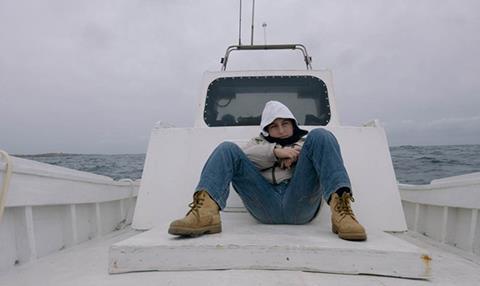Dir: Gianfranco Rosi. Italy-France. 2016. 108mins.

The European migrant crisis has found its cinematic Pietà in Fire At Sea, Italian director Gianfranco Rosi’s powerful, at times shocking but also intensely human documentary about the life of Lampedusa, a small, windswept Mediterranean island of around 6,000 people, which in the last 20 years, as a succinct introductory title informs us, has seen 400,000 sea-borne migrants pass through – and off whose coastline 15,000 more have died.
The film culminates in astonishing, heartbreaking sequences of Italian navy rescue operations filmed by Rosi, who lived on Lampedusa for a year
In films like Below Sea Level or his Venice Golden Lion winner Sacro Gra, Rosi turns his camera – literally, as he is his own DoP – on people living in circumscribed spaces, charting their lives and rituals and ways of making sense of the world, allowing pathos and sometimes humour to emerge in a narration-free observational style. Here, however, he’s more angry, more empathetic, but not, in the end, more judgemental.
Rosi’s decision to channel much of the story through the eyes of a cheeky but still innocent nine-year-old Lampedusan kid, Samuele, seems motivated partly by the need to find a sympathetic – often downright hilarious – guide to island life, an access-all-areas mediator between the camera and the island’s sometimes reticent adult inhabitants. But it also acts as an emotional bridge that makes the stronger content of the film’s second half – where crowded migrant centres and harrowing rescues at sea come to the fore – all the more affecting.
In the first part of the film, we see Samuele doing the things nine-year-old boys do in places like Lampedusa – climbing a tree, making a catapult, riding a Vespa with a friend over the island’s rough tracks and rocky terrain. We meet Maria, his grandmother, who is always cooking or sewing or making beds, Pippo, a young islander seated at the console from which he runs the local radio station, and an elderly scuba diver who we follow underwater, in some of the film’s most poetic sequences, as he dives for sea urchins.
There’s also a kind local doctor – the local doctor, it appears – who we first see administering an ultrasound scan to an African woman who is pregnant with twins.
Samuele is the son of a fisherman, but he gets seasick when he goes out on the boat with his dad; he’s a crack shot with his catapult, but turns out to have a lazy eye, and is ordered to wear a patch over the good one. Or is it Europe that has the lazy eye? Samuele’s island could be a different place entirely, we realise, from the Lampedusa we read about and see on the TV news. A radio news report of a migrant boat shipwreck enters the kitchen where grandma is chopping vegetables, and the fishermen seem to have seen more than they will ever say; but Rosi’s portrait of a place on the extreme southern fringe of Europe, though affectionate, is not just about islands, but insulation, about two worlds that barely touch (it’s perhaps no coincidence that gold-foil survival blankets are a recurrent image).
Flagged by desperate recorded messages picked up by the coastguard in the film’s first half, among other premonitions, the world of the migrants who cross from Libya in unseaworthy boats and fragile dinghies muscles its way gradually into the film from around the halfway mark on. It culminates in some astonishing, heartbreaking sequences of Italian navy rescue operations filmed by Rosi, who lived on Lampedusa for a year and was eventually granted difficult-to-obtain access to patrol boats. He also managed to shoot in the main island detention centre – where he films queues for the payphone, prayer sessions and football matches between fiercely competitive teams divided along national lines – suggesting that solidarity and loyalty bubbles are not just a European problem.
Production companies: 21 Uno Film, Stemal Entertainment, Rai Cinema, Istituto Luce
Co-production: Les Films d’Ici, Arte France Cinema
International sales: Doc&Film International, d.elstner@docandfilm.com
Producers: Donatella Palermo, Gianfranco Rosi, Serge Lalou & Camille Laemle, Roberto Ciccutto, Paolo del Brocco, Martine Saada & Olivier Pere
Cinematography: Gianfranco Rosi
Editor: Jacopo Quadri

























No comments yet